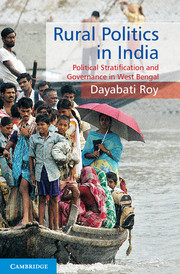Book contents
- Frontmatter
- Contents
- List of Tables
- List of Abbreviations
- Acknowledgements
- 1 Introduction
- 2 Land, Development and Politics in West Bengal
- 3 Changing Landscape of Two Villages in West Bengal
- 4 Seeing the State and Governance in the Grassroots
- 5 Party and Politics at the Margin
- 6 A Narrative of Peasant Resistance: Land, Party and the State
- 7 Caste and Power in Rural context
- 8 Women and Caste: In Struggle and in Governance
- 9 Conclusion: A New Kind of Peasant Mobilization?
- Glossary
- References
- Index
6 - A Narrative of Peasant Resistance: Land, Party and the State
Published online by Cambridge University Press: 05 January 2014
- Frontmatter
- Contents
- List of Tables
- List of Abbreviations
- Acknowledgements
- 1 Introduction
- 2 Land, Development and Politics in West Bengal
- 3 Changing Landscape of Two Villages in West Bengal
- 4 Seeing the State and Governance in the Grassroots
- 5 Party and Politics at the Margin
- 6 A Narrative of Peasant Resistance: Land, Party and the State
- 7 Caste and Power in Rural context
- 8 Women and Caste: In Struggle and in Governance
- 9 Conclusion: A New Kind of Peasant Mobilization?
- Glossary
- References
- Index
Summary
Introduction
Kadampur, the village situated in Singur block of Hooghly district, has been in the eye of a political storm since May 2006 when the state government announced its intention to acquire almost the entire agricultural land in the village for setting up a car factory by one of the biggest industrial houses of India, Tata Motors. In fact, after the licensing policy had undergone major changes due to the implementation of liberalization policy in the 1990s, and the visible decline in the role of the central government and Planning Commission in both conceiving and financing state-level developmental projects, various state governments of the Indian Union acquired quite a bit of autonomy in economic decision making and, as a result, seized the opportunity to attract investors to their respective locations (Rudolph and Rudolph, 2001). West Bengal was no exception in this respect. The Left Front government made efforts to woo the investors for rejuvenation of the state's industrial sector. In this regard, the investment of Tata Motors for a car plant in the state was seen as a major breakthrough to ease the path of industrialization. But the peasants of five villages, including Kadampur, were going to be affected as around 1,000 acres (the exact figure is 997 acres) of agricultural land had been earmarked for acquisition. The government was bent on acquiring the land by virtue of a colonial Land Acquisition Act, 1894.
- Type
- Chapter
- Information
- Rural Politics in IndiaPolitical Stratification and Governance in West Bengal, pp. 156 - 192Publisher: Cambridge University PressPrint publication year: 2013



